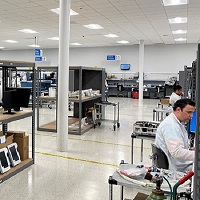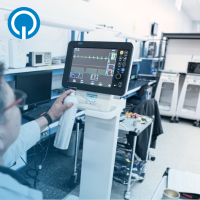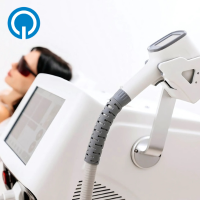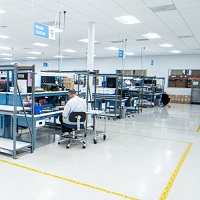
Converting Legacy On-Premise Applications into the “Cloud” for Original Equipment Manufacturers
Over a decade ago, patient recordkeeping relied on rows of file cabinets storing tangible patient records. Data was housed physically as paper files. This method took away valuable square footage in doctors’ offices, hospitals, and warehouses just to store records safely.
With the advent of computer technology, recordkeeping has now gone paperless. Technological advances in computers and software development allow Original Equipment Manufacturers (OEMs) to create applications assisting the end user operators of their systems in capturing, storing, and retrieving data electronically.
Traditional “thick client” applications running through on-premise workstations and servers have dominated the industry for the past few decades, enhancing patient processing throughput within hospitals and clinics while ensuring the portability of patient data. It is safe to say that there are few doctors’ offices, clinics or hospitals that are not using some form of IT systems and applications to run their businesses.
So everything is great, right? Wrong.
As the Healthcare industry has tried to digitally transform itself, many healthcare practices and systems struggle to properly manage this infrastructure.
From patching Operating Systems and Applications ensuring secure and up-to-date systems, to keeping hardware technology refreshed and up to date with enough resources to process and securely store data for patients being examined each day, there are many parts to maintain in a dynamic, complex IT environment.
Being a technical services partner for OEM’s worldwide, Quest and its Cloud and IT specialists have developed a unique pathway to convert traditional thick client on-premise application deployments into a light virtual footprint that can be streamed and operated on the Cloud.
This unique method allows OEM’s to quickly port their existing application architecture within a few weeks into a more modernized “Software as a Service” model. This allows end-users of the applications to eliminate the need to oversee and manage traditional on-premise IT infrastructure traditionally used to operate these environments.
The result is a fully managed environment that is up to date, securely backed up for end-users and a deployed install base that is centrally managed and updated on behalf of OEM’s. This configuration can become more of a subscription-based solution, letting all parties focus on their core competencies regarding patient care.
These records, however, do require special attention when operating in cloud-based environments.
While they may not rely on the same computing power or physical storage space they used to, they now need the proper secured and optimized Cloud infrastructure to be put in place to protect sensitive data.
With the right architecture, it’s a safe, convenient and easy method to store essential documents and run critical applications. Gone are the days of clinical practices and hospitals hosting and managing IT infrastructure to run their healthcare applications.
To accomplish this, Quest leverages patented systems and tools which analyze the physical server environment, move it into the cloud server, sync and migrate data.
Each application is examined to understand how it’s constructed, then the core files are extracted and place on the Cloud to be streamed. Files that live on the Cloud do not run the risk of being lost and retain their architectural integrity, eliminating the need for regulatory approvals.
Additionally Quest maintains devices so OEM’s don’t have to. Our expertly trained IT team can transform, manage and operate every aspect of this turnkey infrastructure ensuring essentially no increase of IT infrastructure on-premise.
Healthcare Original Equipment Manufacturers (OEMs) can use cloud solutions to operate their applications and securely store the data that is input into their devices.
Why cloud-based systems?
Cloud-based systems offer scalable on-demand computational resources and data storage on enterprise-class server systems so that the medical ecosystems can operate, upload data, retrieve information, and store records for as long as legally required - if not longer.
This specific medical ecosystem works in a variety of ways with several advantages built-in. For example, a patient visiting a general practitioner for a routine exam has the medical records stored on a local PC that pushes clinical and/or diagnostic data into an enterprise server /storage stack.
All physicians and their medical teams may also access the application and patient records electronically in a centralized cloud environment from virtually anywhere.
Physicians opting for a Cloud based solution would no longer need to worry about keeping their application, Operating System and security patches up to date. In turn, OEM’s adopting this solution would now be able to centrally deploy application updates and offer a turn key infrastructure solution for practices, allowing their customers to focus on patient care rather than IT infrastructure.
Cybersecurity Concerns
Securing highly confidential medical information on Healthcare IT applications has brought about concern regarding cybersecurity for on-premise IT infrastructure. Ensuring that on-premise infrastructure is regularly patched and updated is essential to maintaining secure patient data and the success of healthcare providers.
As more and more companies turn towards housing information on cloud-based infrastructure, keeping data secure and having a plan of action can mean the difference between a costly data breach and a secure network.
Quest’s highly trained IT technicians have the capability to configure the correct cloud solution for OEM environments. Implementing a robust cloud solution will keep infrastructure secure and using Quest’s cybersecurity services provides the opportunity to stay ahead of a potential breach.
There is a myriad of ways OEMs need IT support and Quest is the solution to these needs. Learn about the different ways Quest International’s on-site hardware and data center management services can best support OEM’s here.
MAR-870 REV 1.0











